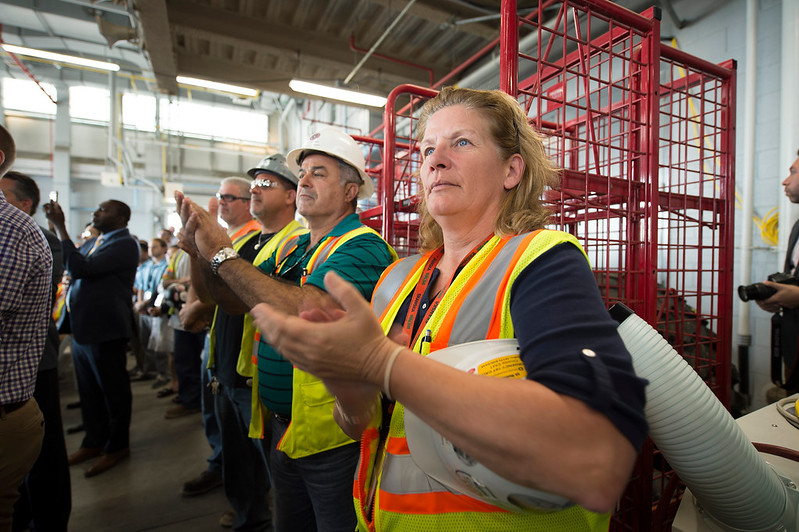
New York workers (photo: Governor Cuomo's office)
To The Editor:
It is no surprise that the trial lawyers’ chief lobbyist and a labor advocate who curiously finds time to push the plaintiff bar’s agenda view litigation as the best way to promote worker safety (“This Labor Day, Celebrate Workers by Ensuring Their Safety,” by Halina Radchenko & Charlene Obernauer).
It’s not.
Over the past century, increased regulations and advancements in workplace safety have saved lives and livelihoods across industries in the United States. Unfortunately, New York’s civil justice system has not caught up. Instead of ensuring that enforcement is left in the hands of accountable public agencies, the Empire State’s regulatory environment often seeks to enforce worker protections through lawsuits, saddling businesses with massive legal costs and enriching trial attorneys without truly increasing safety for workers.
The NY HERO Act, passed earlier this year, is one such example of a misguided attempt to litigate worker safety. In addition to workplace regulations, the law creates a private right of action for exposure to infectious diseases. This means that employers can be sued for alleged COVID-19 exposure after the fact. This hindsight litigation will not make any workers safer, but could instead lead to lawyers shaking down businesses for payouts.
Worker safety should not be about trial lawyer profits. We need regulators, who serve the public interest, to regulate. Deputizing trial lawyers looking to boost their bottom lines will lead to profit-seeking litigation, rather than improving worker safety.
Radchenko and Obernauer also tout New York’s unique Scaffold Law as an example of the state’s support for workers. This outdated statute has long-plagued construction projects in the state by imposing absolute liability on property owners and contractors for height-related worksite injuries, driving up costs for liability insurance and discouraging investment in infrastructure and development. Despite drastic improvements in safety measures on construction sites, this century-old law continues to punish employers, even if a plaintiff is 99% at fault. Most alarmingly, the law has been shown to do nothing to keep workers safe – a study peer reviewed by the Transportation Research Board found that the Scaffold Law may actually increase construction accidents.
For plaintiffs attorneys, civil litigation is an extractive industry. The abundance of advertisements for personal injury attorneys in media, on billboards, and at bus stops across the state, particularly in low-income communities, is further evidence that the plaintiffs’ bar uses New York’s civil litigation system to grow rich off the backs of the economically disadvantaged. And with the latest digital ad technology their advertisements are targeted at construction sites, intersections, and healthcare facilities. A study published in the Vanderbilt Law Review found that “places with many claims per capita...tend to be places with low per capita income.” The same study also finds that attorneys’ fees almost always amount to the maximum allowed by law.
Another bill, awaiting the Governor’s veto or signature, would force companies from other states or countries that do business in New York to accept the general jurisdiction of the state’s courts. This would not, as Radchenko and Obernauer suggest, “strengthen the civil justice system” – on the contrary, if signed into law this bill would promote venue shopping and abusive litigation by enticing out of state attorneys to take advantage of New York’s plaintiff-friendly legal environment. The bill also likely runs afoul of Supreme Court precedent; in 2014, Justice Ginsburg delivered the majority opinion in Daimler v. Bauman, which ruled that general jurisdiction can only be applied in an entity’s home country or state.
Honoring and protecting our essential workers is critical, but in doing so we must be careful not to recklessly promote excessive litigation. Lawsuits have a place in our legal system, but using them to retroactively sue for COVID-19 exposure is at best misguided, and at worst a giveaway to the plaintiffs’ bar, overburdening our courts and harming the businesses that drive our economy.
Sincerely,
Tom Stebbins
Executive Director at the Lawsuit Reform Alliance of New York
On Twitter @LawsuitReformNY.
***
Have an op-ed idea or submission for Gotham Gazette? Email This email address is being protected from spambots. You need JavaScript enabled to view it.




